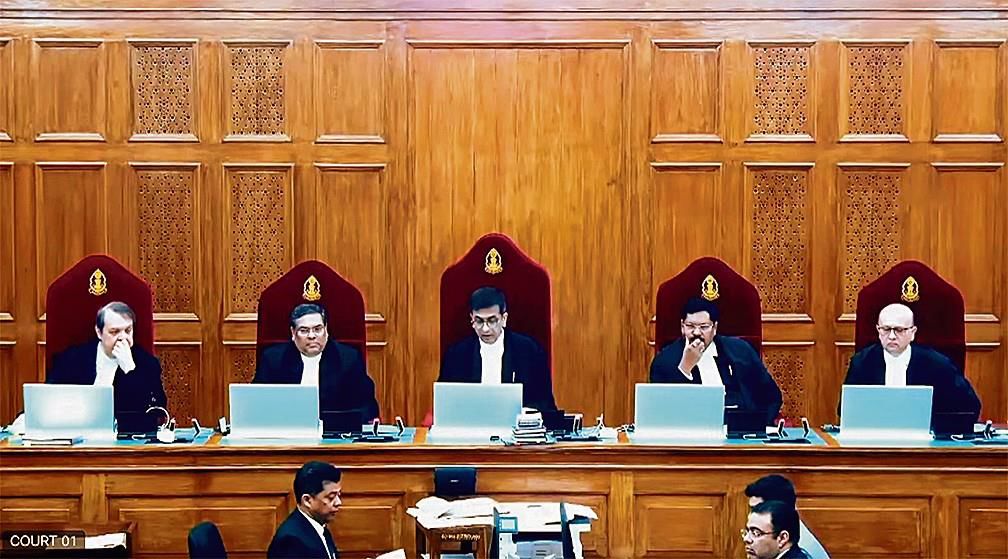In blow to Modi govt, says it violated right to information | Constitution Bench led by CJI orders SBI to halt sale | Asks bank to give details to election panel by March 6

Satya Prakash
New Delhi, February 15
Ahead of the 2024 Lok Sabha elections, the Supreme Court on Thursday declared “unconstitutional” the electoral bonds scheme that allowed individuals and companies to make unlimited anonymous donations to political parties.
Related News
Editorial: Electoral bonds
Noting that voters have right to know, a five-judge Constitution Bench led by CJI DY Chandrachud said the scheme violated Article 19(1)(a) of the Constitution, which guaranteed right to freedom of speech and expression and included right to information within its ambit.
Instrument for funding parties
- Electoral bond is a financial instrument for donations to parties; issued as a promissory note, it doesn’t bear name of buyer/payee; its holder (party) is presumed to be owner
- Comes in multiples of Rs 1K, Rs 10K, Rs 1L, Rs 10L & Rs 1 cr; citizens or domestic firms can donate these; under bond scheme, RP Act was amended allowing parties to withhold donor IDs in filing before EC
Notified in 2018
- 2017 Electoral Bond Scheme introduced in Finance Act, 2017
- Sept 14 Association for Democratic Reforms moves SC
- Oct 3 SC issues notices to Centre, EC on ADR’s PIL
- Jan 2, 2018 Centre notifies scheme
- Mar 26, 2021 SC refuses to stay sale of bonds ahead of polls
- Oct 16, 2023 SC Bench refers pleas to a five-judge Bench
- Oct 31 Constitution Bench led by CJI begins hearing on petitions
- Feb 15, 2024 SC declares scheme unconstitutional
“We are of the opinion the information about funding to a political party is essential for a voter to exercise their freedom to vote in an effective manner. The electoral bonds Scheme and the impugned provisions to the extent that they infringe upon the right to information of the voter by anonymising contributions through electoral bonds are violative of Article 19(1)(a) (right to freedom of speech and expression),” the Bench said. The Beach, which also included Justices Sanjiv Khanna, BR Gavai, JB Pardiwala and Manoj Misra, said the disclosure of information regarding electoral bonds was necessary to identify corruption and quid pro quo transactions in governance. “Such information is also necessary for exercising an informed vote,” it added.
The top court ordered the State Bank of India to stop issuing electoral bonds immediately and submit all details by March 6 to the Election Commission which shall make all donations public by March 13. All electoral bonds within the 15-day validity period shall be returned by political parties to the purchasers, it added.
Justice Khanna delivered a separate but concurring judgment. Welcoming the verdict, petitioner Association for Democratic Reforms’ counsel Prashant Bhushan said: “This is a salutary judgment which will enhance our democratic process.” The Constitution Bench also declared unconstitutional amendments made to the Representation of the People Act (RPA), 1951, the Income Tax Act, 1961, and the Companies Act, 2013, through the Finance Act, 2017, to facilitate introduction of the scheme.
Earlier, political parties had to declare all contributions more than Rs 20,000 with no exceptions, and maintain a record of all donations exceeding Rs 20,000 for tax purposes. In a financial year, companies could contribute a maximum of 7.5% of their average net profits from the preceding three years. The amendments did away the restrictions to allow political parties to receive funds through electoral bonds.
Introduced through the Finance Act, 2017, an electoral bond is a bearer instrument like a promissory note which can be purchased by an Indian citizen or an Indian company whose identity would remain secret from everybody except the SBI from whom it has to be purchased. Once purchased, the buyer can give it to a political party, which could encash it using its bank account.
